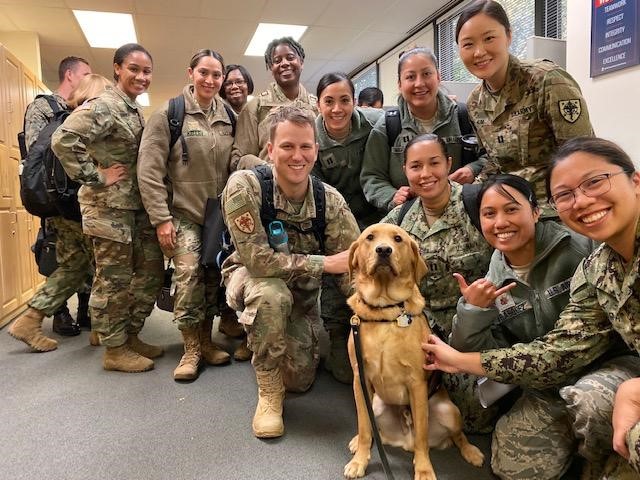Nurse Practitioners: Caring for the Warfighter
By Lt. Sarah Tuparan, USU Graduate School of Nursing
National Nurse Practitioners Week is being held this week to honor nurse practitioners throughout the United States. As advanced practice nurses, NPs hold advanced degrees and national board certifications, provide patient-centered care in primary, acute, and specialty care settings, order, perform and interpret diagnostic tests, and prescribe medications and other treatments. There are more than 270,000 NPs nationwide and more than 800 NPs in the Armed Forces. Military NPs operate in many capacities as leaders and providers in a multitude of settings from military treatment facilities, on U.S. bases overseas, during humanitarian missions and in deployed environments. Nurse Practitioner specialties in the military include Family, Mental Health, Women’s Health, Acute Care, Pediatric, and Neonatal NPs, and Certified Nurse Midwives.
| Now-Air Force Maj. Natasha Best, while deployed to Bagram Air Base. (Photo screen capture from video by 455th Air Expeditionary Wing Public Affairs) |
Major Natasha Best, U.S. Air Force, DNP, WHNP-BCDNP, FNP-C
Current Role: Assistant Professor, USU Family Nurse Practitioner (FNP)/Women’s Health Nurse Practitioner (WHNP) Program
Maj. Best’s role has continually evolved, from transferring to the Air Force from the Army as a Women’s Health Nurse Practitioner, obtaining her Doctorate of Nursing Practice, to becoming an assistant professor at USU for the FNP/WHNP Program. As military medicine also continues to change with the DHA merger, Maj. Best hopes the Air Force will continue to recognize the need for specialized women’s health care and its impact on mission readiness with the increasing trend of women joining the military.
Words of Advice: “While obtaining your degree can be challenging, especially when you’re in the thick of it, take time to appreciate your circumstances and soak up as much information as you can, because the first year as a novice nurse practitioner is truly when you will come across the most challenging part of your career!”
Commander Melissa Troncoso, U.S. Navy, NP-C, CHWC, MSN
A USU GSN alum already, Cmdr. Troncoso applied for the Nursing PhD program after seeing the challenges service members faced with access to proper nutrition while stationed at Naval Hospital Beaufort, South Carolina. “I want to help our active duty become healthier and stronger and the best way is through policy change. As a provider, you can make all the recommendations you want but if policy doesn’t support it, nothing will change. Having the PhD combined with my clinical experience, research background, and senior leadership will help direct policy change and make the shift towards a culture of health.”Words of Advice: “Find a mentor, someone you can go to for clinical advice and emulates the clinical practice you want to have.”
Jennifer Trautmann, Ph.D., RN, FNP-BC
 |
Dr. Jennifer Trautmann (USU Photo by Thomas Balfour) |
An Air Force veteran, Dr. Trautmann decided to apply for FNP school after separating from active duty service. Following several years of practice in civilian and military healthcare, Dr. Trautmann obtained her Ph.D. from the University of Virginia and completed a post-doctoral fellowship at Johns Hopkins, while teaching nurse practitioner graduate students in primary care at both universities. “I joined the faculty here at the GSN last year, because I believe in the mission of education those who care for those in harm’s way!”
Words of Advice: “Stay humble and always strive to learn more about medicine. Commit to being a lifelong scholar! And never be afraid to ask questions.”
Lieutenant Commander Kara McDowell, U.S. Navy, DNP, FNP-C
 |
Navy Lt. Cmdr. Kara McDowell following graduation from USU. (Courtesy Photo) |
After graduating from USU last year, Lt. Cmdr. McDowell was stationed at the U.S. Naval Hospital in Yokosuka, Japan. “I was very nervous when I first started practice but I learned so much in my first six months as a military FNP. I am now in my second year of practice and several factors have continued to increase my clinical confidence over the last year and a half. I have seen short and long term positive patient outcomes based on my diagnoses and treatment plans and have also been able to maintain continuity of care with several of my patients and families for over a year now. The most rewarding part of my practice is building rapport with patients and assisting them in maintaining their health. The most challenging aspects of practice continue to be time management and staying current with the latest guidelines and evidence. It helps to look at each day as a unique learning opportunity to continue to learn and evolve as a clinician."
Words of Advice: “Get as much procedural experience as you can during clinicals. Also, build documentation templates based on practice guidelines before you start in clinic.”
Colonel John M. Williamson, U.S. Air Force, DNP, FNP-C
 |
| Air Force Col John Williamson, (USU Photo by Thomas Balfour) |
Assistant Professor of Military and Emergency Medicine, USU
Col Williamson has been an active duty Air Force Nurse Corps officer for nearly 25 years. He was a critical care nurse, emergency department nurse, and flight nurse before changing nursing practice directions to become a Family Nurse Practitioner. He came to USU because he wanted to help teach the new generation of nurse practitioners in the Military Health System and share both the didactic and practical knowledge and experience he has gained. “My three years here teaching in the GSN has been the most rewarding experience in my career. Seeing the growth and development of our graduate students and medical students molding into great APRNs and MDs ready to treat those in harm's way, makes me grateful to be a part of the GSN and School of Medicine faculty team!”
Words of Advice: "Treat every patient as if they are your family member and provide patient-centric care to the extent your scope of practice allows."






